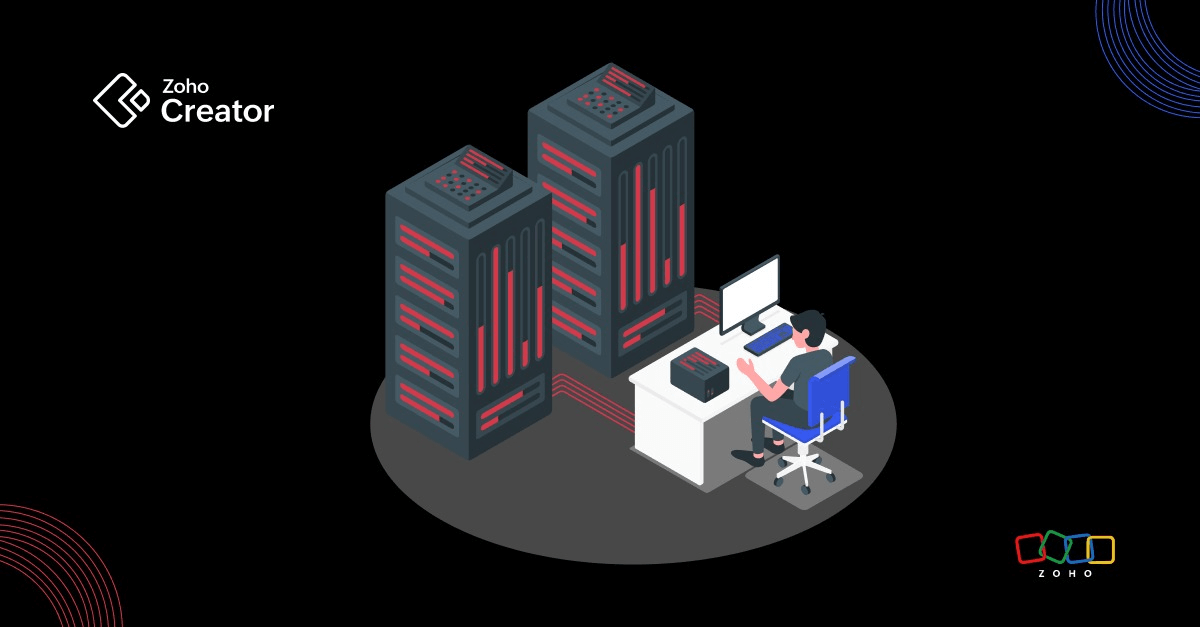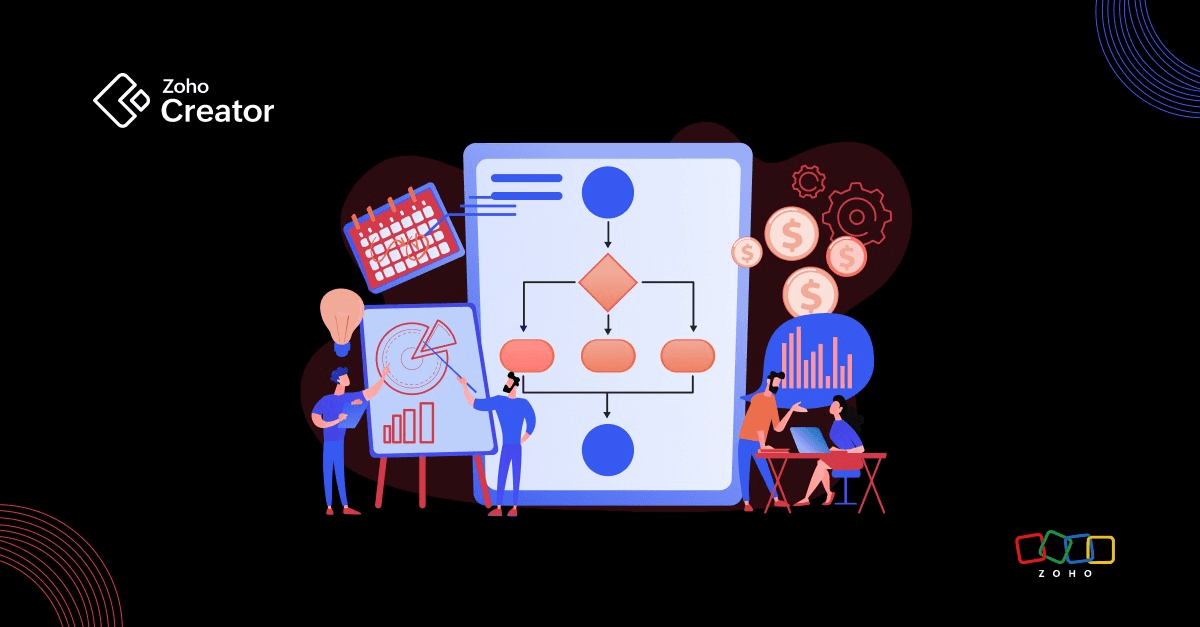- HOME
- Know Your Tech
- Professional developers vs. citizen developers: A comparison guide
Professional developers vs. citizen developers: A comparison guide
- Last Updated : June 19, 2023
- 1.4K Views
- 17 Min Read
Over the past few years, a new movement has been brewing in the world of software development: the rise of citizen developers. These are individuals who have no formal coding training, yet they're creating their own applications and tools to solve a wide range of problems. While this may seem like a new trend, citizen developers have actually been around for quite some time, and their numbers are growing rapidly.
So, why are we seeing more citizen developers? There are several reasons for this trend. First, technology is becoming more accessible and user-friendly, making it easier for non-technical people to create their own applications. Additionally, many organizations are embracing low-code and no-code platforms, which provide a bridge between professional development teams and citizen developers. These platforms offer a simplified interface and pre-built components that make it possible for non-technical users to build applications quickly and easily.
Despite the rise of citizen developers, there's still a lot of skepticism surrounding their abilities. After all, how can someone with no formal coding training produce high-quality, reliable software? This is where the importance of comparing citizen developers to professional developers comes into play.
Professional developers have spent years honing their craft and gaining expertise in their field. They understand programming languages, design patterns, software architecture, and other critical concepts that are essential to creating top-notch software. Citizen developers, on the other hand, may not have this same level of expertise. However, what they lack in technical knowledge, they make up for in domain expertise.
Citizen developers are often experts in their field, whether that be marketing, sales, accounting, or any other area of business. They understand the unique challenges faced by their colleagues, and they're motivated to solve these problems with technology. This deep understanding of the problem they're trying to solve can often lead to better, more innovative solutions.
To ensure that citizen-developed applications are up to par, it's important to establish a framework for evaluating their quality. This framework should take into account factors such as usability, functionality, scalability, and security, as well as the overall user experience.
Ultimately, a successful software development team will combine the best of both worlds. Professional developers can provide technical expertise and guidance, while citizen developers can offer domain expertise and a unique perspective on the problem at hand. Together, these two groups can create software solutions that are both innovative and effective.
Who is a "citizen developer"?
The term citizen developer has gained a lot of attention in recent years due to the increasing popularity of low-code and no-code platforms. A citizen developer is someone who uses these tools to develop custom applications or software solutions that aren't created by professional developers.
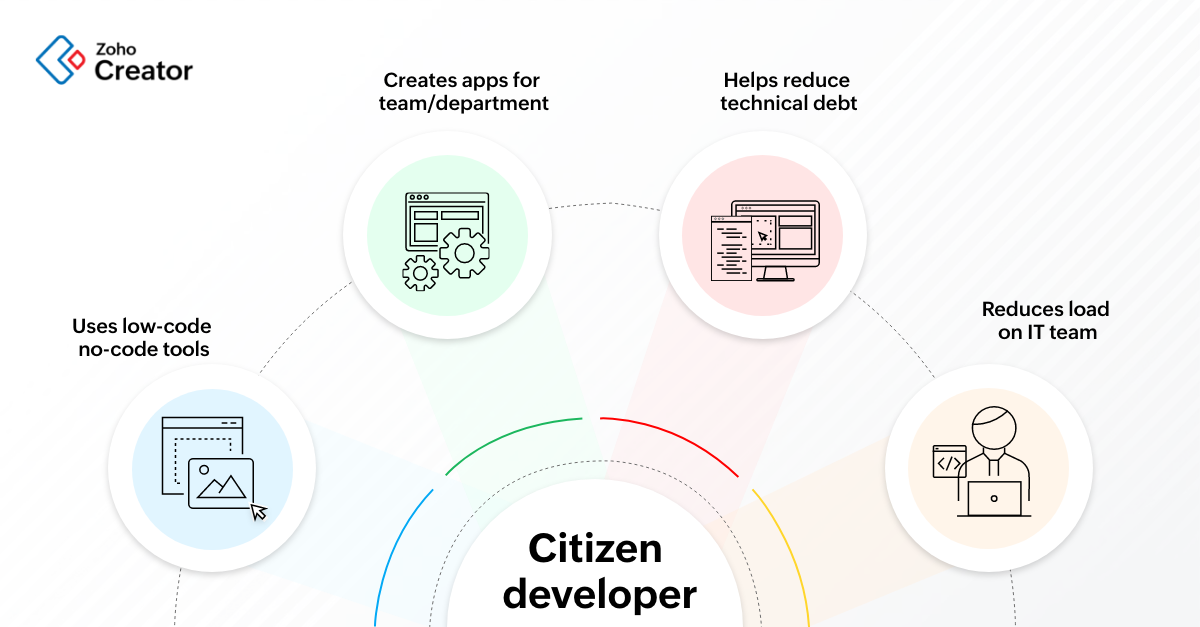
The rise of citizen developers can be attributed to the increasing demand for more personalized software solutions within organizations. Traditional software development can be a costly and time-consuming process, which often leads to a backlog of project requests. Citizen developers can help alleviate this backlog by creating their own solutions without the need for extensive technical knowledge or experience.
Many enterprises are embracing the concept of citizen developers and are offering training programs and resources to enable employees to become proficient in using low-code and no-code platforms. This approach not only helps to address the demand for custom applications but it also empowers employees to be more efficient and productive.
Although citizen developers are democratizing software development and enabling organizations to be more agile, there are also challenges that need to be addressed. For example, organizations must ensure that citizen developers adhere to security protocols and best practices to prevent data breaches and other security risks. Additionally, it's important for organizations to have proper governance procedures to manage the development process and ensure that citizen-developed applications integrate smoothly with other enterprise systems.
Roles and responsibilities of citizen developers
The roles and responsibilities of a citizen developer are varied and depend on the organization they work for. Some of the primary roles and responsibilities include:
Strategy: Citizen developers are typically experts in their respective areas of business. As such, they provide valuable insight into business processes and requirements that can help to define software specifications.
Building applications: The most important role of the citizen developer is to build applications that meet specified business requirements. This requires them to work closely with IT teams to ensure that the applications are secure, effective, and compliant with industry standards.
Testing and debugging: Citizen developers are responsible for testing and debugging their applications to ensure that they function as intended. They must also be able to identify and fix any errors that may arise.
Maintenance and upgrades: Citizen developers also contribute to the maintenance and upgrading of applications they have built. This includes fixing issues, adding new features or functionality, and ensuring that the application continues to meet business needs.
Collaboration: Citizen developers must have strong communication skills to work effectively with other members of the organization, including IT teams, business analysts, and other citizen developers. Working collaboratively helps ensure that everyone is working towards the same goals.
Advantages of having citizen developers in a company
Lower costs: One of the significant advantages of having citizen developers is that it can save the company a significant amount of money. Because employee-driven software development becomes more cost-effective than hiring external developers, organizations can save on the costs of the development phase. Additionally, citizen developers may be more in tune with the specific needs of the business than external developers would be, allowing them to solve problems more effectively.
Speedy problem-solving: Having in-house developers who can create small applications that address specific business needs is a recipe for faster problem resolution and timelier testing of new approaches. Citizen developers, by acting in this capacity, can shorten internal communications chains, leading to shorter time-to-market times.
Creativity and business insights: Another advantage of citizen developers in the company is creativity. These individuals approach challenges and negotiate solutions from a business perspective that's closer to the ground. Ideas that come from field-level observation have the potential to be innovative and contextually relevant, increasing their effectiveness.
Disadvantages of having citizen developers in a company
Security risks: While citizen developers can potentially develop solutions to business problems, the opposite side of this coin is that there might be risks involved in using end-user–developed applications. Such applications may not be defensively coded against hacking attempts or have robust data protection measures, which can lead to data loss or digital attacks.
Quality issues: Because citizen developers may not have the same level of expertise as professional developers, there's a risk of lower quality code than commercial software. This isn't necessarily a deal-breaker, but testing and quality assurance regimes require more meticulous oversight and structuring to ensure that all code is cohesive and bug-free.
Ethical questions: Citizen developers also possess a certain level of risk concerning ethical considerations. They may infringe on intellectual property laws in the development of their applications, particularly when they use third-party libraries or don't account for licensing structures of the code they use when developing applications. These incidents can tarnish not only the individual's reputation but also the organization's.

Who is a "professional developer"?
The term professional developer refers to an individual who's trained and experienced in the art of developing software applications. These developers can be responsible for creating code, designing user interfaces, writing and executing tests, debugging, and maintaining software programs.
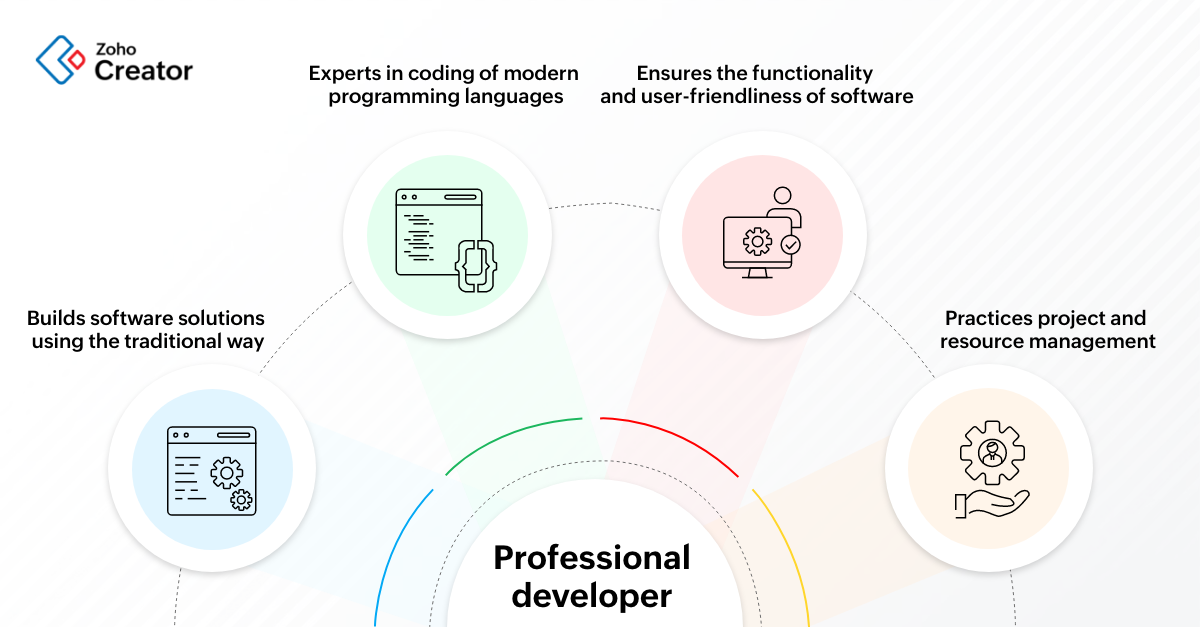
Professional developers can be employed by software development companies, or they may work as freelancers who are hired to complete specific projects. In either case, the primary focus of a professional developer is to deliver high-quality software that meets the needs of the client or end-user.
To become a professional developer, individuals will typically need to have a strong foundation in computer science, as well as experience with programming languages and development frameworks. They should possess the ability to think critically and solve problems analytically, as well as strong verbal and written communication skills.
Professional developers should be familiar with a wide range of technologies and frameworks, including but not limited to Java, Python, PHP, Ruby, AngularJS, and React. They should also be familiar with industry best practices, such as test-driven development, continuous integration, and code reviews.
One of the key responsibilities of professional developers is to ensure that the software they build is both functional and user-friendly. This can be achieved through careful design and testing, as well as implementing user feedback to iterate and improve the software over time.
In addition to technical skills, professional developers should also possess a strong work ethic and a commitment to delivering high-quality results on time and within budget. They should be able to work independently or as part of a team, and be able to communicate effectively with clients and other stakeholders.
They encompass a wide range of skills and responsibilities, and are critical to the success of software development projects. Whether employed by a development company or working independently, professional developers must possess a strong foundation in computer science, technical expertise, and a commitment to delivering high-quality software that meets the needs of clients and end-users alike.
Roles and responsibilities of a professional developer
As a professional developer within an organization, there are numerous roles and responsibilities to uphold. Here are some of the most significant ones:
Writing quality code: As a developer, your foremost responsibility is to write high-quality code that meets the organization's needs. This includes writing clean, efficient, and well-documented code that can be maintained easily.
Problem-solving: Developers need to be problem-solvers, able to identify and address complex technical issues while keeping the business's requirements in mind. They should be able to use their skills and expertise to find innovative solutions to problems.
Collaborating with other teams: Developers usually work in collaboration with other teams, including designers, project managers, and other developers. Communication skills and the ability to collaborate are essential in ensuring that projects are completed successfully.
Active learning: Professional developers should always be open to learning new technologies, tools, and trends. They should actively seek out new knowledge and techniques to improve their skills and stay up-to-date with developments in their field.
Testing and debugging: Developers should be able to write tests for their code to ensure that it's of high quality, and that any bugs are caught and fixed during testing. Debugging is a crucial role that developers play in identifying and fixing any issues in the software.
Technical documentation: Professional developers need to create detailed technical documentation for their code, which will help other developers and stakeholders understand the code and how it functions.
Time management and prioritization: Developers should be able to manage their time and prioritize tasks effectively. This includes ensuring that deadlines are met and the project is delivered on time.
Security: Developers play a crucial role in ensuring that the software they develop is secure. They should know the basics of security and how to keep their code secure from vulnerabilities and attacks.
Advantages of having professional developers in a company
Enhance the quality of products and services: Professional developers have the expertise and experience to deliver high-quality products and services. They can design, develop, and maintain complex software systems, databases, and mobile applications, which can help a company stand out in its industry.
Increase productivity: Professional developers can help a company automate its business processes, which can increase productivity and efficiency. They can create software solutions to automate repetitive tasks, reduce errors, and improve overall workflow.
Improve customer satisfaction: A team of professional developers can help a company deliver better customer experiences. They can develop software systems that are easier to use, faster, and more reliable, which can lead to improved customer satisfaction and loyalty.
Stay competitive: In today's fast-evolving business world, it's essential to stay ahead of the curve. Companies that have professional developers on staff can develop innovative solutions that set them apart from their competitors. They can leverage the latest technologies to develop products and services that meet the changing needs of customers.
Disadvantages of having professional developers in a company
Cost: Hiring professional developers can be expensive. They command high salaries and benefits, making them a significant cost for any company. Additionally, they may require expensive tools and equipment, software licenses, and other resources to perform their work effectively.
Recruitment challenges: Finding the right developers to hire can be challenging. The best developers are in high demand, and competition for top talent can be fierce. It may take a significant amount of time and effort to find and recruit the right developers for a company.
Management complexity: Managing a team of professional developers can be complex. They often have their own way of working, which may not fit into the company's existing processes and systems. Additionally, they may require a high degree of autonomy and flexibility, which can be difficult for some managers and leaders to provide.
Risk of employee turnover: Professional developers are in high demand, and they may receive offers from other companies that can offer better salaries, benefits, or working conditions. This can lead to a high turnover rate, which can be disruptive to a company's operations.

A comparison of skills and expertise required for each role
Technical expertise
Professional developers typically have a deep understanding of programming languages, coding practices, and software development tools.
Citizen developers may be proficient in using low-code or no-code platforms, but their technical expertise may be limited to a specific tool or platform rather than a broader knowledge of programming principles.
Domain knowledge
Professional developers may not have the same level of familiarity with the business context, which could limit their ability to create effective solutions.
Citizen developers often have a strong understanding of the business domain for which they're creating applications.
Collaboration skills
Professional developers often work in teams, collaborating with others to develop high-quality software.
Citizen developers may work independently or with a smaller group, which could limit their exposure to best practices in collaboration and teamwork.
Quality assurance
Professional developers understand the importance of comprehensive testing and quality assurance processes to ensure the reliability and stability of their applications.
Citizen developers may not have the same level of experience with testing and quality assurance practices, which could lead to less reliable or less secure applications.
Time and resource management
Professional developers are often skilled at managing time and resources to ensure that projects are completed on schedule and within budget.
Citizen developers may not have the same level of project management and resource allocation skills, which could result in longer development timelines or resource constraints.
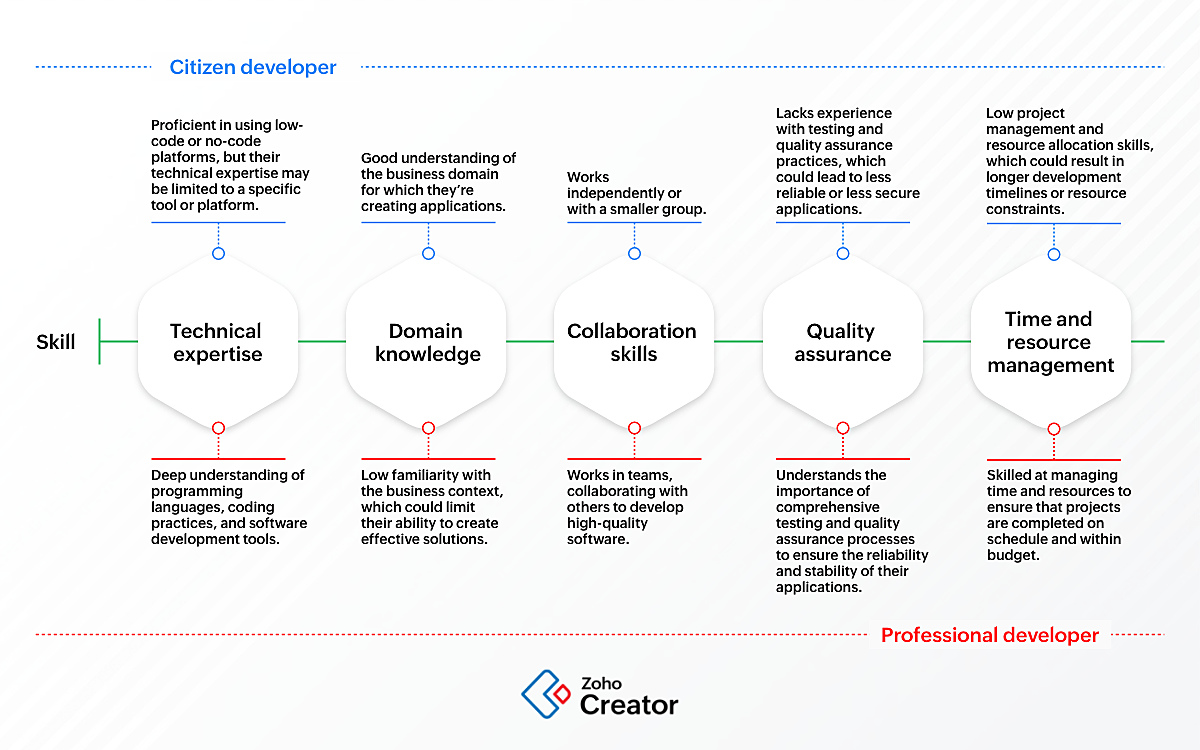
A comparison of tools and technologies used by each role
Citizen developers
Citizen developers rely heavily on low-code and no-code platforms to build software applications. These platforms come with pre-built templates, drag-and-drop interfaces, and point-and-click tools that make it easy for non-technical people to build software applications. Some of the popular low-code and no-code platforms used by citizen developers include:
PowerApps: PowerApps is a low-code platform that allows citizen developers to create custom applications quickly and easily. The platform comes with drag-and-drop tools and integrates well with other Microsoft products.
Bubble: Bubble is a no-code platform that lets citizen developers create web and mobile applications without any coding skills. The platform comes with pre-built templates, pre-built components, and a visual editor that allows developers to build software applications visually.
Zoho Creator:Zoho Creator is a low-code platform that allows citizen developers to quickly develop and deploy applications. The platform comes with built-in databases, drag-and-drop tools, visual editors, and other features.
Google App Maker: Google App Maker is a low-code platform that allows citizen developers to create business applications quickly and easily. The platform comes with pre-built templates, drag-and-drop tools, and integrates well with other Google products.
Professional developers
Professional developers rely on traditional programming languages and frameworks to build software applications. They have a deep understanding of programming concepts, data structures, and algorithms. Some of the popular programming languages and frameworks used by professional developers include:
Java: Java is a popular programming language used by professional developers to build web and mobile applications. It has a rich set of libraries, frameworks, and tools that make it easy to build complex software applications.
JavaScript: JavaScript is a scripting language used by professional developers to build web applications. It's used to add interactivity to web pages, create mobile applications, and build server-side applications.
Python: Python is a general-purpose programming language used by professional developers to build web applications, data analytics applications, and machine learning applications. It has a simple syntax and a large community of developers.
Cost and efficiency comparisons
Cost
The cost of hiring professional developers can be high due to their specialized skills and experience. On average, a professional developer in the United States can cost anywhere between $80,000 to $150,000 per year in salary and benefits.
Citizen developers, on the other hand, can already be found within the organization and may not require any additional compensation. They may already possess the skills required for software development, or they may be trained in the specific technologies needed.
In addition, citizen developers can often complete projects on a part-time basis or during their regular work hours, reducing the need for additional staffing or outsourcing costs.
Efficiency
Professional developers have often studied and trained for years to become experts in their field. They possess in-depth knowledge of programming languages, software development techniques, and best practices.
Citizen developers, while not necessarily possessing the same level of expertise, can be just as effective. They often have a deep understanding of business requirements and can develop solutions that are tailored to the organization's needs.
Citizen developers can also be more agile in their development approach, because they aren't constrained by the same rigid processes and protocols that may be required of professional developers.
Factors to consider when deciding between hiring a citizen developer or a professional developer
When it comes to software development, the decision to hire either a citizen developer or professional developer is an important one. Both have their own set of advantages and disadvantages, and it's essential to consider each factor carefully before making a final decision. Here are some of the factors to consider when deciding between hiring a citizen developer or professional developer:
Skill level: Professional developers have years of experience and training in software development, making them highly skilled in their craft. Citizen developers, on the other hand, have limited experience and may not have the breadth of knowledge that professional developers possess. Therefore, if you require complex software development, it's best to go for a professional developer.
Cost: Citizen developers are typically less costly than professional developers. They can be hired at a fraction of the cost of a professional developer. However, the quality of work and speed of delivery may not be as high as that of a professional developer.
Timeframe: Citizen developers can be a better choice if you need a quick turnaround time on a project because they're usually more readily available than professional developers, who may take a longer time to complete a project because of their other commitments, such as ongoing projects and client demands.
Project size: The size of the project will also play a significant role in the choice of developer. For smaller projects that require simple coding, citizen developers might be a better choice. However, for larger and more complex projects, it's best to choose professional developers.
Quality standards: Professional developers are committed to delivering high-quality work that meets the necessary standards. They also have considerable experience in quality assurance testing, ensuring that your project is of the highest quality. Citizen developers, on the other hand, may lack the experience needed to provide such a level of quality assurance testing.
Code maintainability: Code maintainability is an essential factor to consider when hiring software developers. Professional developers are more likely to write maintainable code that's easy to update and interpret in the future if changes are needed. Citizen developers may not pay as much attention to code maintainability, making it more challenging to update codes in the future.
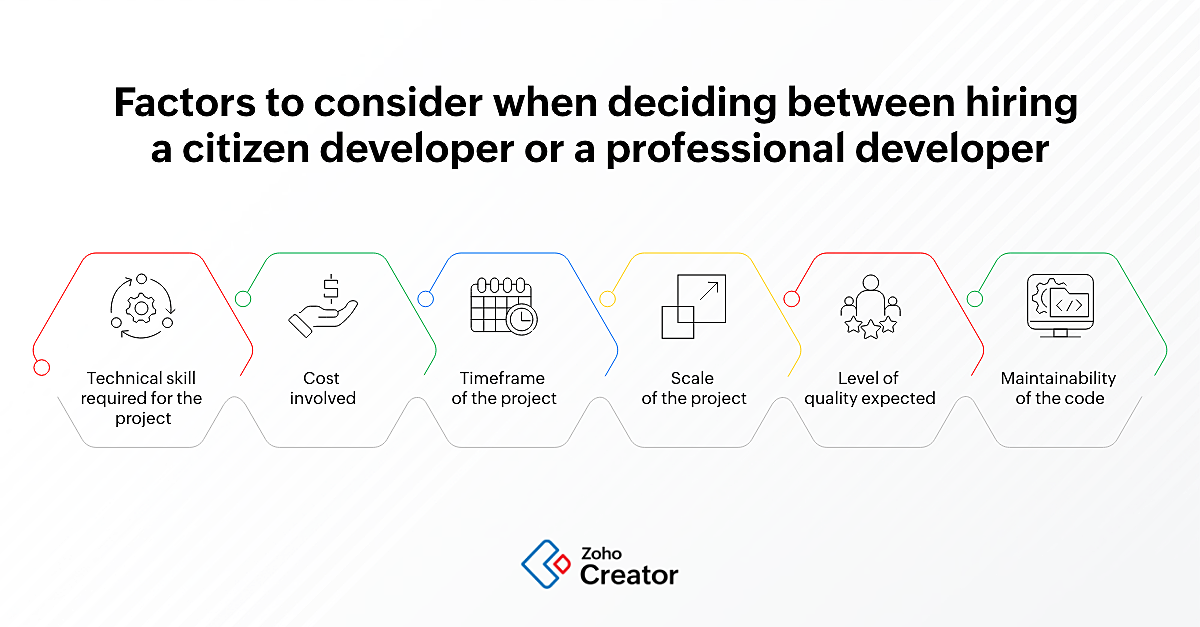
When one role may be more suitable than the other
Building simple applications: Citizen developers can create simple applications, such as forms, surveys, and data entry applications, using low-code platforms. These applications can be built quickly and efficiently, and don't require advanced programming knowledge. Professional developers may find these applications too simple or basic, and may not be willing to spend time on them.
Developing complex applications: When it comes to developing complex applications, professional developers are better equipped to handle the task. They have a deeper understanding of programming languages, software architectures, and other technical aspects of software development. Citizen developers may not have the necessary skills and experience to develop complex applications.
Customization: Citizen developers can customize existing applications or templates to meet the specific needs of their organization. They can add or remove features, change the user interface, and modify the functionality of the application. Professional developers can also do this, but they may require more time and resources to complete the task.
Data analysis: Citizen developers can create data visualizations and dashboards using low-code platforms. They can access data from multiple sources and analyze it to gain insights into their organization's performance. Professional developers can also do this, but they may have to write complex code to access and manipulate data from different sources.
Integration: When it comes to integration, professional developers are better equipped to handle that task. They have the skills and experience to integrate different software systems and technologies seamlessly. Citizen developers may not have the necessary skills and experience to integrate complex software systems.
Time: Citizen developers are better suited when there is a need to build simple applications quickly. Professional developers may take longer to complete the task because they have to write complex code and adhere to strict software development processes and standards.
Budget: Citizen developers are more cost-effective when it comes to building simple applications. Professional developers may charge more for their services due to their extensive expertise and experience.
Complexity: Professional developers are better equipped to handle complex applications that require extensive programming knowledge and experience. Citizen developers may struggle to develop such applications due to their limited programming knowledge.
Balancing the skills and expertise of both citizen and professional developers
Balancing the skills and expertise of both citizen and professional developers in a company is of utmost importance for the growth and success of the organization. While professional developers bring in their technical knowledge and experience, citizen developers bring in their business acumen and domain expertise. Let's delve deeper into why the collaboration of both groups can lead to a more successful outcome.
Different perspectives: Citizen developers bring unique perspectives to the table that professional developers may not encounter in their day-to-day work. They understand the nuances of business and can use their practical knowledge to develop solutions that are more aligned with the company's goals.
Faster delivery: Leveraging citizen developers can significantly speed up the time-to-market of projects. Citizen developers can quickly create prototypes without going through the lengthy process of engaging with professional developers, freeing up resources for more critical projects.
Enhanced innovation: Collaborating with citizen developers enables professional developers to explore new ideas and innovate faster. Citizen developers can offer new insights into a project, which can lead to more innovative solutions.
Reduced costs: By using citizen developers to handle simpler development projects, professional developers can focus on more complex and critical ones. It leads to cost savings when organizations don't need to outsource these projects or hire more professional developers to manage these projects.
Improved agility: Successful businesses are agile and can respond to market changes quickly. Using both citizen and professional developers can help in creating an agile business culture where the organization can respond more quickly to customer demands and market changes.
Better quality: When citizen developers collaborate with professional developers, the quality of the product is likely to be better. Professional developers bring in the necessary technical expertise, while citizen developers bring a better understanding of their business unit. This collaboration can lead to higher-quality solutions.
Improved team morale: By collaborating and breaking down silos between citizen and professional developers, team morale improves as employees work together, creating a more inclusive environment that fosters innovation and creativity.
This collaboration will not only result in better project delivery but can also help in creating an inclusive work environment where employees feel valued and engaged.
Conclusion
The debate between citizen developers and professional developers is one that requires careful consideration. Each approach offers its own advantages and disadvantages, depending on the needs of the organization. Ultimately, it's important to weigh your options and make an informed decision based on the specific application requirements at hand. That way, you can make sure that you get the best of both worlds—speed and agility with professional-grade development.
Whether you choose to go with a citizen developer or professional developer, we hope this guide has helped shed some light on the differences between the two.
Now that you know the differences between citizen developers and professional developers, why don't you try Zoho Creator? With a few clicks, you can create powerful applications without having to write any code. Go ahead and give it a try—you'll be surprised at what you can do. Good luck!
Happy coding!
 Pranesh
PraneshPranesh is a serial entrepreneur and the Founder of Studio 31, a 12 year old, deep tech enabled, wedding photography and film company that has been recognized by many publications for its zero inventory model and unique culture in the unorganised sector.
Zoho Creator has helped Studio 31 redefine its business model by automating over 37 processes and save three hours every single day. He is also a growth consultant for Zoho Creator and helps the team address real-world challenges from a customer's point of view.

